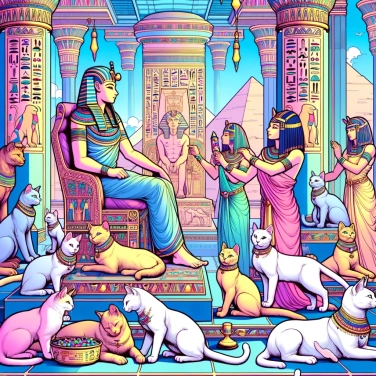Cats were revered in Egyptian culture due to their association with the goddess Bastet, goddess of joy, music, and maternity. Cats were also seen as protectors, chasing away harmful rodents that threatened the Egyptians' crops.

In ancient Egypt, cats were perceived as unique creatures capable of freely moving between the world of the living and that of the dead—a rather prestigious role. The Egyptians believed that they possessed a genuine spiritual energy, a kind of magical power, allowing them to ward off evil spirits and avert misfortune. It was even thought that a cat's mere gaze could detect and alert its owner to a spiritual threat invisible to humans. Moreover, after their death, cats were often carefully mummified so they could peacefully join their masters in the afterlife. For the ancient Egyptians, a cat in the household was much more than just a pet; it was almost a kind of living talisman.
For the Egyptians, having a cat at home was like having a real little bodyguard against evil spirits. They firmly believed that cats had a special gift for chasing away malevolent entities or negative energies. For example, by observing their vigilance and their ability to see in the dark, people thought they possessed a kind of clairvoyance that allowed them to spot dangers invisible to the human eye. Their bright eyes in the night symbolically represented this protective power against curses and the forces of chaos. Practically, by welcoming a cat into the home, one sought to protect their family, their house, or their crops by keeping misfortune, illness, and bad influences at bay.
Ancient Egypt worshipped several feline deities, but the most famous remains the goddess Bastet with a cat's head. She embodied fertility, maternal love, gentleness, and protected the home. During certain religious celebrations, the Egyptians gathered in large numbers to honor Bastet, even bringing cat mummies as offerings to win her favor and ensure her support. Another notable deity, Sekhmet, was depicted as a fearsome lioness, symbolizing warrior power and divine vengeance. These sacred figures significantly influenced the way Egyptians regarded cats in daily life, making them revered and essential animals in the ritual practices of the time.
The Egyptians saw cats as lucky creatures with protective powers. When a cat died, the family often entered a deep mourning, to the point of shaving their eyebrows as a sign of grief. Their mummified bodies were frequently found placed in small special tombs surrounded by offerings for their journey into the afterlife. Thousands of these mummified felines are found today in sacred cemeteries. Some rituals went so far as to honor their memory with regular offerings, often food, hoping to attract their protective spirit alongside the living.
In ancient Egypt, harming a cat meant immediately facing the worst troubles. These animals enjoyed a highly protected status, legally defined: killing a cat, even accidentally, could be punished by the death penalty. Just that! If a fire broke out, Egyptians sometimes preferred to save a cat before thinking about their material possessions. When a family cat died, it was a time of great sadness at home: owners often shaved their eyebrows to mark their mourning. And it was impossible to take a cat out of Egyptian territory: these animals were considered national treasures strictly protected, prohibited from export.
Smuggling a cat out of the borders of ancient Egypt was considered a serious crime, as these animals were regarded as a sacred national treasure.
Egyptian families often mourned by shaving their eyebrows after the death of their pet cat, thus marking their deep sadness and respect for the animal.
During fires or other disasters, the ancient Egyptians prioritized saving their cats, sometimes valuing their lives even above their own material possessions.
The goddess Bastet, depicted as a woman with the head of a cat, symbolized fertility, motherhood, the protection of the home, and the joy of living, perfectly illustrating the privileged status of the cat in ancient Egypt.
Yes, cats were present among all social classes, from the royal family to more modest households. Regardless of the family's wealth, the spiritual protection offered by cats was considered essential in daily Egyptian life.
Among the most well-known feline deities are Bastet, the protective goddess of the home, depicted as a cat or a woman with a cat's head; and Sekhmet, the warrior goddess and protector of the pharaoh, represented as a lioness.
Upon the death of a pet cat, Egyptian families could organize genuine funeral rites, which included a process of embalming and official mourning periods. Owners would sometimes shave their eyebrows as a sign of grief.
Yes, archaeologists have discovered several cemeteries specifically dedicated to cats, notably in Bubastis, the sacred city of the goddess Bastet. Thousands of feline mummies have been found there, reflecting the respect and importance that the Egyptians placed on cats.
Absolutely. Cats were highly valued for their ability to ward off rodents and snakes from food stores, thereby effectively protecting Egypt's precious grain harvests. This role partially contributed to their sacred status.
Cats, being sacred beings associated with divine protection, were considered a grave offense against the deities to kill. Thus, injuring or killing a cat could lead to very severe penalties, ranging from financial sanctions to the death penalty.

0% of respondents passed this quiz completely!
Question 1/6